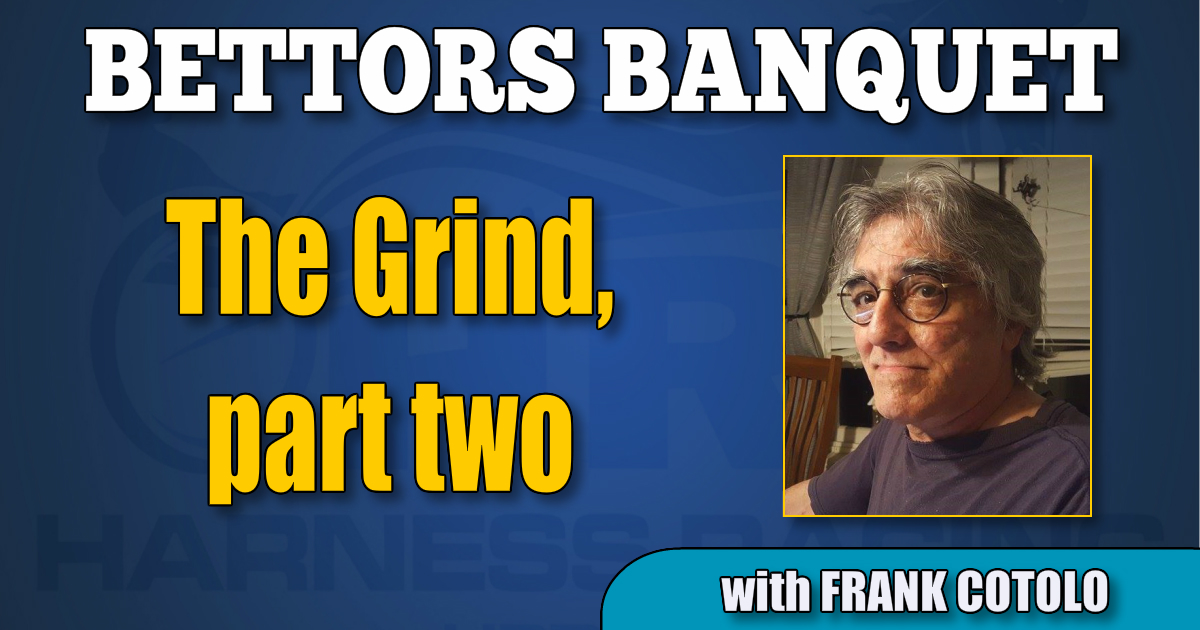The Grind, part two
by Frank Cotolo
Playing horses to win is the rudimentary function of all pari-mutuel wagering. Because making a profit is our goal when betting any race, any other bets should be abandoned without a clear decision to play a horse to win.
In as far as any rule of play may go, suffice it to say the playing any exotic wager without having a win bet is nothing less than cavalier. To put it another way, a win wager is never sacrificed for any other bet.
Professional horseplayers have found that to be a sound rule because they also know that having a win bet is the inspiring factor for making any other wagers on single- or multi-race exotics and that when they do, the promise of a sincere return is, more times than not, valuable.
Keeping the profit motive in mind and being objective about everything Bettors Banquet (BB) practices, read what follows closely.
Secondary and sparingly, a bettor in a “Grind” mode (a Grinder) addresses exotic wagers only as supplements to a win bet; exotic wagers then become dependent upon the win bet and that horse becomes the “key” horse in all exotic combinations; that is, all exotic wagers will be built upon the key horse as their winner.
The object behind having a key horse in order to make exotic wagers is to aim for maximum profits. After all, if the bettor has deemed a key win bet valuable (its chances seem higher than its odds), it will also attend to raising the return price of an exotic.
Next, the Grinder works to assure maximum profits for key-horse-guided exotic combos by ignoring costly procedures used by others betting into exotic pools. That is, buying the least number of combo sets that are, for all due purposes, “losing” tickets.
This requires a commitment to the separate win bet and a very short list of other candidates that help build exotic tickets in the other-than-win positions required. A Grinder dismisses boxing exactas and stacking many probables in any exotic combo and prohibits any use of the “All” option at any time. These rules direct money to have specific decisions about contenders joining the exotic set. That eliminates the waste invested in huge combo tickets.
As well, these rules allow for a most important profit factor — playing exotics’ combinations more than once (that action will be discussed in future BBs).
Here is a sample example of how a Grinder (as in every scenario BB makes, our fictional Delaney) might invest in single-race exotics following the procedures above.
Delaney decides the 5 horse, one of his top three contenders in the race, offers the best value in the win pool. He plays that 5 horse to win. Delaney then buys exactas with his other two contenders, the 1 and the 7, in the second positions.
Then he plays a trifecta, again with his key horse in the win position, but this time he plays his other two contenders each in the second and third finishing spots. He will rarely go deeper than the demand of three finishing events (see part one for exotic wagering event demands) and, if successful, at most, buys merely two losing tickets.
Delaney’s wagers:
BET TYPE – HORSE(S)
Win – 5
Exactas – 5-1; 5-7
Trifectas – 5-1-7; 5-7-1
If the race above is the opening leg of a multi-race “Pick” exotic, intrinsic problems arise if Delaney wants to address the Pick stream. He has to decide three key win bets for a Pick 3, four for a Pick 4, etcetera, and has to forecast the best value to assign key horses before substantial wagering on the other legs take place. This is where common multi-race players waste money by adding too many tickets and cost to a Pick stream.
Plus, exotic-betting menus host pools of Pick races that overlap (a Pick-5 stream may include a Pick-3 stream, a leg of a Pick-4 stream may be an ingredient of a Pick-6 stream and so on). Important factors leading to a valuable win wager become more speculative.
As well, the base costs of playing most exotics have dropped to retro-comic-book prices. The lure to participate in as many exotics as possible is greater than ever, but without judicious choices and tickets limited in scope, the results are left more to a matter of luck than handicapping or smart wagering. Over time, enough of these wagers lost is devastating to a player’s bankroll.
Here is a common example of hitting a 50-cent Pick 3 that is a time-and-money wasting investment. It’s from Jan. 17 at The Meadows:
Race 8 1/4/5/7
Race 9 2/4/5
Race 10 4/5/6
The ticket costs $18 for correctly having the single set of winners — 7/5/4. The price to collect a single set is $19.40. A profit of $1.40 on an $18 ticket is the kind of profit that paves a sturdy road to the Poorhouse.
To be continued…
















